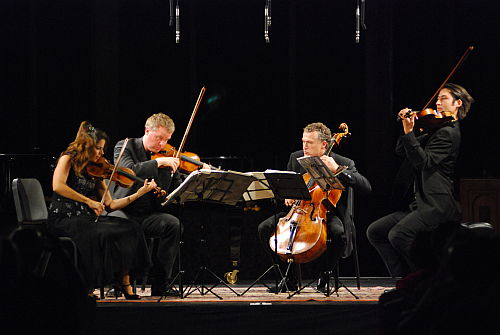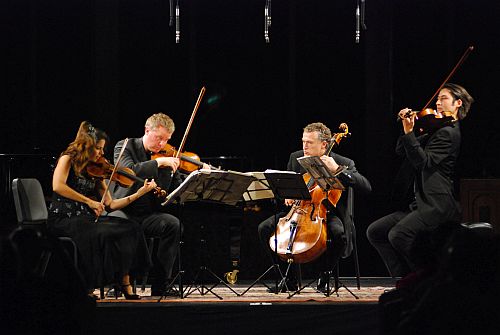 Germany Mendelssohn, Shostakovich & Beethoven: Pacifica Quartet, Herkulessaal, Munich, 25.3.2015 (MC)
Germany Mendelssohn, Shostakovich & Beethoven: Pacifica Quartet, Herkulessaal, Munich, 25.3.2015 (MC)

Mendelssohn – String Quartet No. 6 in F minor, Op. 80
Shostakovich – String Quartet No. 9 in E-flat major, Op. 117
Beethoven – String Quartet No. 8 in E minor, Op. 59 No.2
Outside cities it is becoming increasingly difficult to attend chamber music concerts and I relished this opportunity on my annual Munich trip to hear the world class Pacifica Quartet at the Herkulessaal. Having reviewed a number of Pacifica CDs I have been especially impressed with its complete set of the Mendelssohn string quartets recorded in 2002/2004 on Cedille and more recently the complete set of Shostakovich string quartets, that come together with a quartet each by Miaskovsky, Prokofiev, Weinberg and Schnittke, recorded in 2010/12 also on Cedille.
Seeing the programme immediately I was struck by the strength and balance of the of the chosen works and was delighted that the Pacifica commenced with Mendelssohn’s String Quartet No. 6 in F minor, Op. 80 a work completed in 1847, a mere two months before his death. Full of striking contrasts not typical of Mendelssohn’s output in general this is a work written in homage to his sister Fanny who had died a few months earlier. Sometimes referred to as a ‘Requiem for Fanny’ the heart-breaking third movement Adagio, such a fitting Elegy for her, profited by gravely beautiful playing and subtle control that washed over like a balm. There was an unmistakable potency given by the Pacifica to the squally nature of the remaining movements as if reflecting the composer working through the anger phase of his complex and unbearable grief.
Next the Shostakovich String Quartet No. 9, Op. 117 a fine choice and a refreshing change from the ever popular String Quartet No. 8. As with the Mendelssohn quartets the Pacifica is specialist in this Soviet/Russian repertoire and assuredly conveyed the spirit of the composer’s individual sound world. Traversing a myriad of emotions including shades of a Klezmer band, a madcap polka, tension filled determination to the quotations of the galloping Rossini ‘William Tell’ theme the performance of this E flat major score was captivating in its contrasting expression.
From Beethoven’s middle period the E minor score is the second of the three opus 59 ‘Razumovsky’ quartets commissioned by Count Andrey Razumovsky a Tsar’s ambassador at the Vienna Court and an accomplished amateur violinist. Overflowing with fresh and unconventional ideas these quartets were groundbreaking, expanding the full tonal range of the instruments. With such elevated assurance and faultless unison the Pacifica uncovered the beguiling atmosphere of this marvellous score. My highlights were the highly romantic quality given to the aching beauty of the second movement Molto Adagio and the determined and incisive approach with subtle control of pace and dynamics in the following Scherzo movement. For its encore the Pacifica treated the Herkulessaal audience to the Allegretto pizzicato movement from Bartók’s String Quartet No. 4. As an alternative encore I did wonder if the Pacifica had ever thought of playing the almost entirely pizzicato Allegro: the Scherzo from Kalliwoda’s String Quartet No. 1 – a much lesser known work.
Marked by impeccable unity and flawless intonation throughout the Pacifica could have been breathing as a single entity such was the elevated level and consistency of this remarkable performance. String quartet playing doesn’t get any better than this and I strongly urge chamber music lovers to hear this world class quartet at the earlier opportunity.
Michael Cookson
